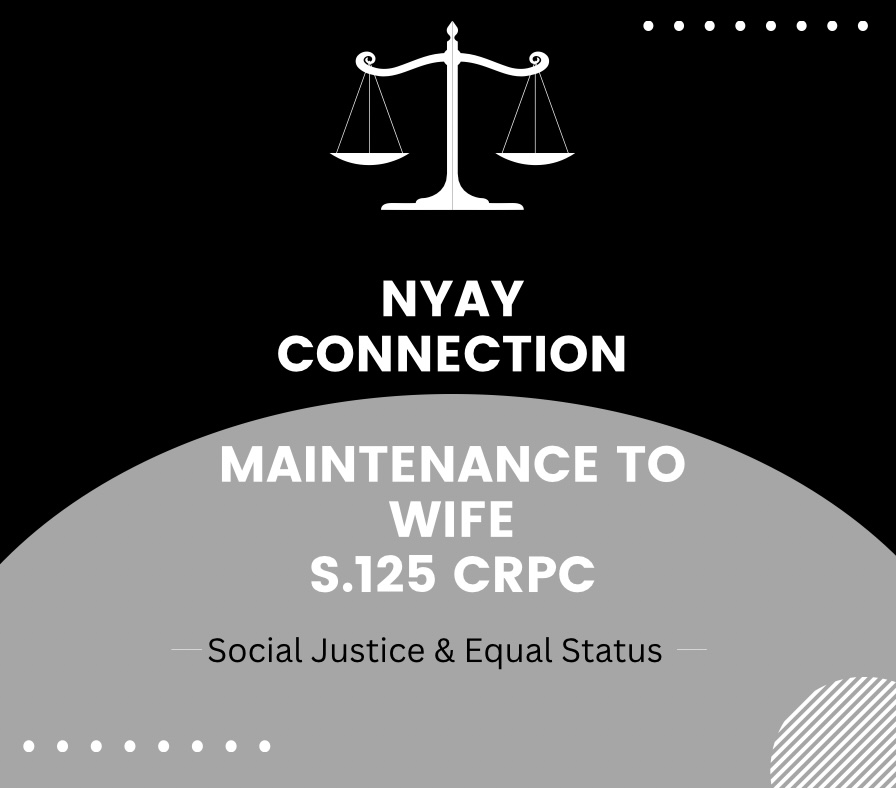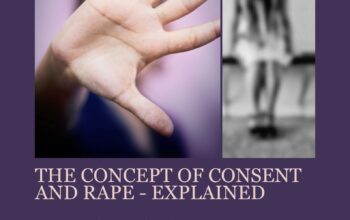Section 125 of the Code of Criminal Procedure (hereinafter CrPC) is a social justice legislation with the aim to protect and safeguard the interests of wives, children, and parents. Maintenance under the law is ‘monetary support’ that is given to the dependent for their sustenance, including provisions for food, clothing, residence, and medical attendance and treatment. Section 125 of CrPC is secular in nature and holds authority over everyone irrespective of their governing personal law. The provision also provides for interim maintenance, where the court can order the husband to support his wife while the matter is sub-judice.
Among others, as listed under Section 125 of CrPC, a husband is bound to maintain his wife. If he has sufficient means to do so but wilfully refuses. We shall understand all of these terms but first, let’s define what is included in the definition of a wife.
For the purpose of this section, a wife includes a legally wedded wife as well as a divorced woman, who has not remarried. Therefore, a second wife is not entitled to any maintenance under this provision. However, the Hon’ble Supreme Court in the case of Savitaben Somabhai Bhatiya v. State of Gujrat (2005) 3 SCC 636 held that when the husband has tricked the second wife into marrying him by withholding information about the first wife, the husband cannot deny maintenance to the second wife in such circumstances as he cannot take advantage of his wrong. Further, the Hon’ble SC in the case of Khemchand Omprakash Sharma v. State of Gujrat 2000 SCC 753 held that the children of a second wife are entitled to claim maintenance.
The need for maintenance arises when the dependent, which in this case is the wife, is unable to maintain herself or in other words, cannot maintain the same standard of life which she had while she was married. The husband, in such cases, is entitled to provide her maintenance, not just for the bare essentials but, for restoring that same standard of living. The inability of a wife to maintain herself is a condition precedent to granting maintenance. If the wife has the means to maintain herself, the suit will not stand, for instance, wife’s income shall be considered while deciding the claim for maintenance. However, the income of the parents is irrelevant in these cases as was held in the case of Ramdayal Vaishya v. Anita Kumari 2004 Crl. 3 3669 (3670) MP.
Sufficient means : include not only visible sources like property and employment but also includes other factors. If a husband has the ‘earning capacity’ then it shall be taken into consideration, while deciding the quantum of maintenance. An able-bodied person is presumed to have earning capacity and cannot avoid liability on the ground that he is unemployed. In the case of Tarak Shaw v. Minto Shaw 1984 Cr LJ 206 (Cal) the Court held that even in the case of insolvency of the husband, the capacity to earn being there on him, it is material to construe that he has the means.
Neglect or refusal to maintain is the failure or omission on the part of the husband to fulfil his duty to maintain his wife if he has sufficient means. For example,subsequent marriage by the husband, cruel behavior of the husband, etc. are clear proof of neglect.
GROUNDS FOR REFUSAL OF MAINTENANCE –
A wife shall not be liable to claim any maintenance in the following circumstances :
(i) if she has remarried.
(ii) if she is living in adultery
(iii)is she refuses to live with the husband without any sufficient reason. Anil S/O Suganchandra Jain v. Smt. Sunita W/O Shri Anil Kumar Jain Criminal Revision No. 829 of 2014 where the wife left the house of her own volition without any force, she would not be entitled to claim any maintenance from her husband.
(iv) the husband and wife live separately by mutual consent. Moyabai v. Vishram Singh 1992 Cr.L.J. 601 where it was held that divorce by mutual consent does not deprive a wife of her right to claim maintenance.
CONFLICT BETWEEN PERSONAL LAW AND SECTION 125 CrPC –
Perhaps the most famous case in this regard is the case of Mohd. Ahmad Khan v. Shah Bano Begum 1985 AIR 945 where in 1975, Shah Bano who was 62 years of age at the time, was divorced by her husband and thrown out of her matrimonial home along with her children. In April, 1978, she brought an appeal under Section 125 CrPC for maintenance.
The issues raised before the Court were-
1) Whether Section 125 will apply to Muslim Wives?
2) What is the period for which the husband is entitled to maintain the wife?
3) Whether the payment of dower absolves a muslim husband from his liability to maintain the wife?
In a landmark judgment given by the Supreme Court, it was held that Section 125 is a secular provision and will apply to all women irrespective of their religion. The exclusion of Muslim women would violate Articles 14 and 21 of the Constitution. Section 125 is a social welfare legislation aimed to protect women from poverty, hunger, and destitution.
The Court further held that the term ‘divorced wife’ will include a divorced Muslim wife and the husband is under an obligation to maintain her until she remarries. The Supreme Court held that the payment of the dower will not absolve the husband of any liability, the purpose of maintenance and dower are completely different in nature.
AFTERMATH OF THE SHAH BANO CASE –
The decision of the Shah Bano Case saw protests like never before. The interference was not taken well and as a result the Muslim Women (Protection of Rights on Divorce) Act 1986 was enacted with the sole purpose to nullify the judgment of Shah Bano case. Under Section 2 of the said act, the maintenance claim of a wife was restricted to the iddat period. After the period of iddat, if the woman is unable to maintain herself, the liability to maintain her would fall on the relatives who were entitled to inherit from her and if there are no such relatives, the liability would fall on the State Waqf Boards.
The Constitutionality of the 1986 Act was challenged in the case of Danial Latifi v. Union of India 2001, where the Supreme Court upheld its constitutionality and further held that the liability of the husband to maintain his wife is not limited to the iddat period, in fact, that is the time period within which the husband has to make arrangements to maintain his wife. Therefore, the liability to maintain the wife would essentially extend beyond the period of iddat if the wife is unable to maintain herself.
ENFORCEMENT OF SECTION 125 CrPC –
Section 125(3) of the Code of Criminal Procedure provides for the manner of enforcement-
- Warrant for Fines
- Imprisonment may extend to one month until payment is made, if after the warrant if part or whole of the amount remains unpaid.
Thus, the aim of Section 125 CrPC is social justice, especially in the case of a wife who is at a disadvantage because of several societal pressures and a lack of awareness regarding their rights. The Supreme Court has been fairly liberal in its construction of Section 125 CrPC which has helped in alleviating the inequality towards women and it still continues to do so.
This article is written by Prerna Pathak. Prerna is pursuing her L.L.M. from Jamia Millia Islamia.
If you are a law student or professional and want to contribute to this website by publishing any legal article, send your your submission at nyayconnection@gmail.com.





Nicely explain with the easy concept! Thanks for giving this knowledgeable insight.
Excellent & very Knowledgeable article, well done ????
Very well articulated.